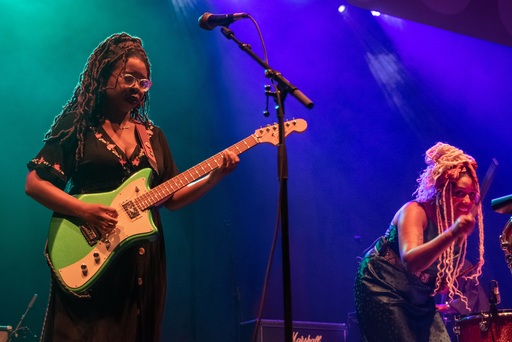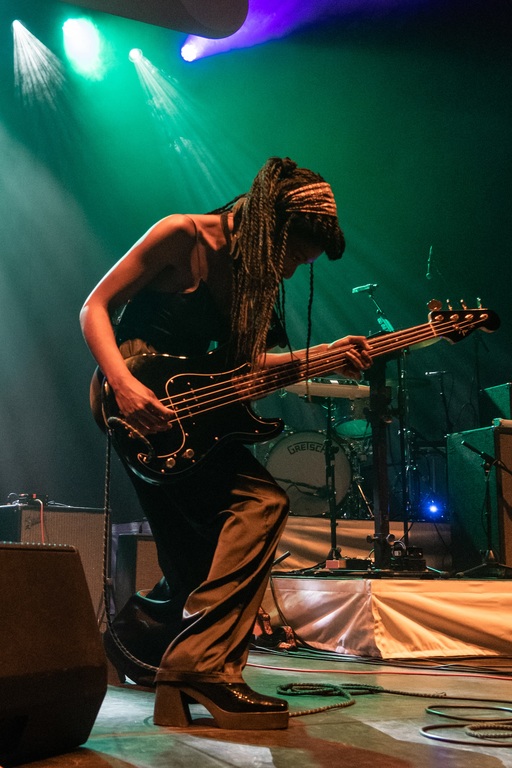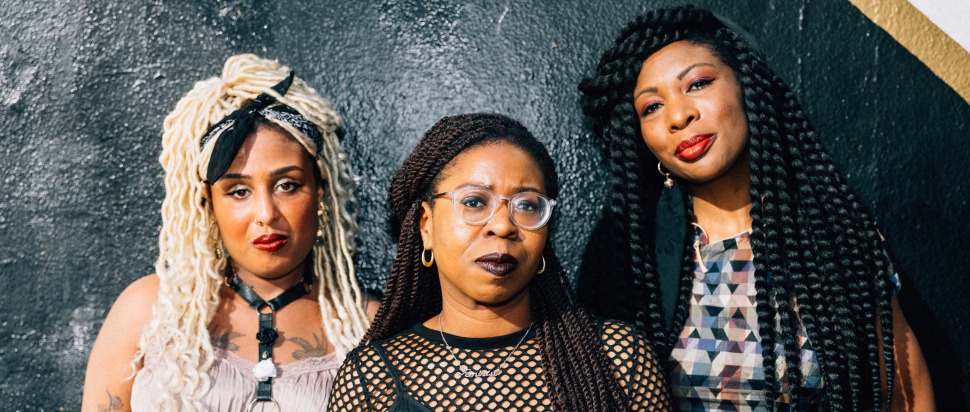Big Joanie on their new album Back Home
Big Joanie talk about the expansive sound of their second album Back Home, the many meanings of home and the ongoing challenges faced by the music industry
It should come as no surprise that on their second album Back Home, Big Joanie’s sound has expanded well beyond the perimeters of their 2018 debut Sistahs. The intervening years have seen the London DIY punk group sharing major stages around Europe with the likes of St. Vincent, Sleater-Kinney, Gossip and Bikini Kill, and that increase in scale can now be heard reflected in their increase in ambition.
"We wanted to take what we’ve learned from them and bring it into this next era of Big Joanie," says singer/guitarist Stephanie Phillips. "It’s definitely something we were thinking about, we wanted to be a bigger Big Joanie and to sound more rounded out and to have it sound like it’s not just us playing our three instruments, but to almost sound like an orchestra."
The trio, born from the self-starting underground punk scene in the UK's capital, first started making waves in the mid-2010s with their fearless Black feminist ethos and their tight, riot grrrl-inflected post-punk rhythms, but on Back Home, they appear to come of age. The album builds on all of their musical influences, but sees them take confident strides into their own space, producing a group of songs that cut sharply with infectious melodies, trenchant attitude and more than a dash of sonic experimentation.
"Yeah, I think a lot has changed, really," says Phillips. "You can hear a development in our band in terms of us learning and becoming more confident in our instruments and our abilities."
One of the developments has come in Big Joanie’s in-studio process. Songs started coming together more naturally this time around, with the group less rigidly sticking to their instrumental lineup, allowing more room for invention. Sainted, for example, one of the album’s advance singles, saw Phillips moving to synths and regular bassist Estella Adeyeri taking guitar lead; elsewhere, songs started acquiring extra musicians, such as violinist Charlotte Valentine, or building guitar parts that would require multiple players. The sum total is an album charged with the spirit of liberation.

Big Joanie @ The Usher Hall, by Dale Harvey
"For the first album," says drummer Chardine Taylor-Stone, "it was very much just getting a recording of us with some overlaid instruments. This time, we were looking at the studio almost as an instrument in itself. It’s about thinking as an album band when we’re making music. It’s always the record that is the legacy, that’s the thing that people are hopefully going to listen to in ten, 15 years’ time, so it’s about making that a piece of work in and of itself."
The band pinpoint one sea change moment as having come when they recorded a fuzzed-out cover of Solange’s Cranes in the Sky for Jack White’s Third Man Records in 2020. "Sonically, that is the beginning of the Back Home album, in terms of the visual imagery in music that we want to create," says Taylor-Stone. "I don’t really like using the word sophisticated, because it’s naff, but it’s just being stronger in our vision and aesthetic. The depth of sound on that single is reflected throughout the new album."
That depth is heard on the track Today, for example, with its stoner, Mojave Desert languidness, or in the art-rock sensibility of Cactus Tree, the rolling feedback of which opens the album with a boldly adventurous salvo. "I never thought of it as leftfield until Margo [Broom, Back Home producer] asked if we were sure we wanted to open with it," says Phillips. "It’s in the mould of bands like Throwing Muses or Pixies, building around a particular weird sound and making something experimental and poppy out of it. We always wanted to open with it, it’s quite definitive."
The title Back Home is designed to carry multiple meanings. The band members grew up in different parts of England, and while for Phillips and Taylor-Stone, moving to live in London might have helped for professional reasons, making a home there did not prove an easy task. "We felt really precarious in London, like we never had anywhere there that we could call home," explains Phillips. "You’re always feeling on edge.
"But also, the use of the phrase 'back home' has a different meaning for us as the descendants of migrants and people who’ve come here from the diasporic community. What home means to that community is not necessarily England, but somewhere else. And even then, since we were all born here in the UK, that home isn’t necessarily our home either. So it’s about thinking about where we can find home and find peace and space."
References to this topic are littered throughout the album, and they breathe life into the record’s cover art, too. Designed by multidisciplinary artist Angelica Ellis, the image depicts Ellis’ embroidery of a photograph of Taylor-Stone's four-year-old nephew at the barbers, surrounded by ackee flowers, an image intended to invoke the embroideries often found in post-Windrush Caribbean family homes in the UK.
"The barber shop is quite a central point in diaspora cultures, it’s where people hang out and have conversation," says Taylor-Stone. "Hair is quite an important thing in Black culture too, obviously. But we could be talking about any diaspora actually, whether it’s from Ireland or anywhere. But it started with that image, and then it expanded to attempt to include traditional crafts and women’s quilting in African America and the Caribbean, the diaspora of enslaved peoples and those amazing crafts."

Big Joanie @ The Usher Hall, by Dale Harvey
These passions extend well beyond the trio’s work with Big Joanie. Adeyeri and Phillips, for example, are both part of the collective behind Decolonise Fest, an annual, not-for-profit DIY punk festival organised by and for POC punk bands, while Taylor-Stone was recently the vice chair of the Equality, Diversity and Inclusion Committee at the Musician’s Union in 2021. Further to the Cranes in the Sky cover, Phillips also recently finished writing a book about Solange, "to put her in her context and to make sure that she’s celebrated properly," as she puts it.
There is no doubting that Big Joanie strive to represent the change they wish to see in the music industry and in society at large. For a band so immersed in the workings of their own industry, their observations ought to serve as a wake-up call. "Post-pandemic, people are trying to push themselves through these crazy tours," says Taylor-Stone. "Everyone is making money except for the artists and something needs to be done, particularly around streaming.
"There are bands playing Brixton Academy for five nights in a row, 20,000 people – they should be zillionaires by now, but most of them have only just given up their jobs. The losses we’ve made because of streaming as artists have been catastrophic for us. I have a full-time job, we all do, and we’re trying to tour on the side. And because of the cost-of-living crisis and Brexit, the costs have gone up even more. We do it because we love it, we don’t do it for money, because you just wouldn’t do it."
"There is no real commitment to shifting power in that industry," adds Adeyeri. "When you go and see who’s managing those big booking agencies and those labels, it’s still just the same older, more privileged white men basically. We’re lucky enough to be with a booking agency that was founded by four women, but I haven’t seen any other agencies with that structure."
Despite the continuing intransigence of the business they love, they remain optimistic about the fact that young and talented new artists are still emerging all the time. Indeed, it is in no small part thanks to the visibility of diverse, outspoken groups like Big Joanie and their unwavering commitment and support for the cause that the music industry is finally starting to see the benefits of broader representation at a grassroots level.
"There have been many more POC bands starting in the punk scene and young people don’t even notice that it might’ve been an issue ten years ago," says Phillips. "When we started, it was seen as a bit odd that we wanted to be a Black punk band, our messaging was seen as a bit weird. But now that wouldn’t be looked at twice – it would actually be celebrated in a lot of ways."
Big Joanie release Back Home on 4 Nov via Daydream Library Series; Big Joanie play Mono, Glasgow, 14 Jan 2023
